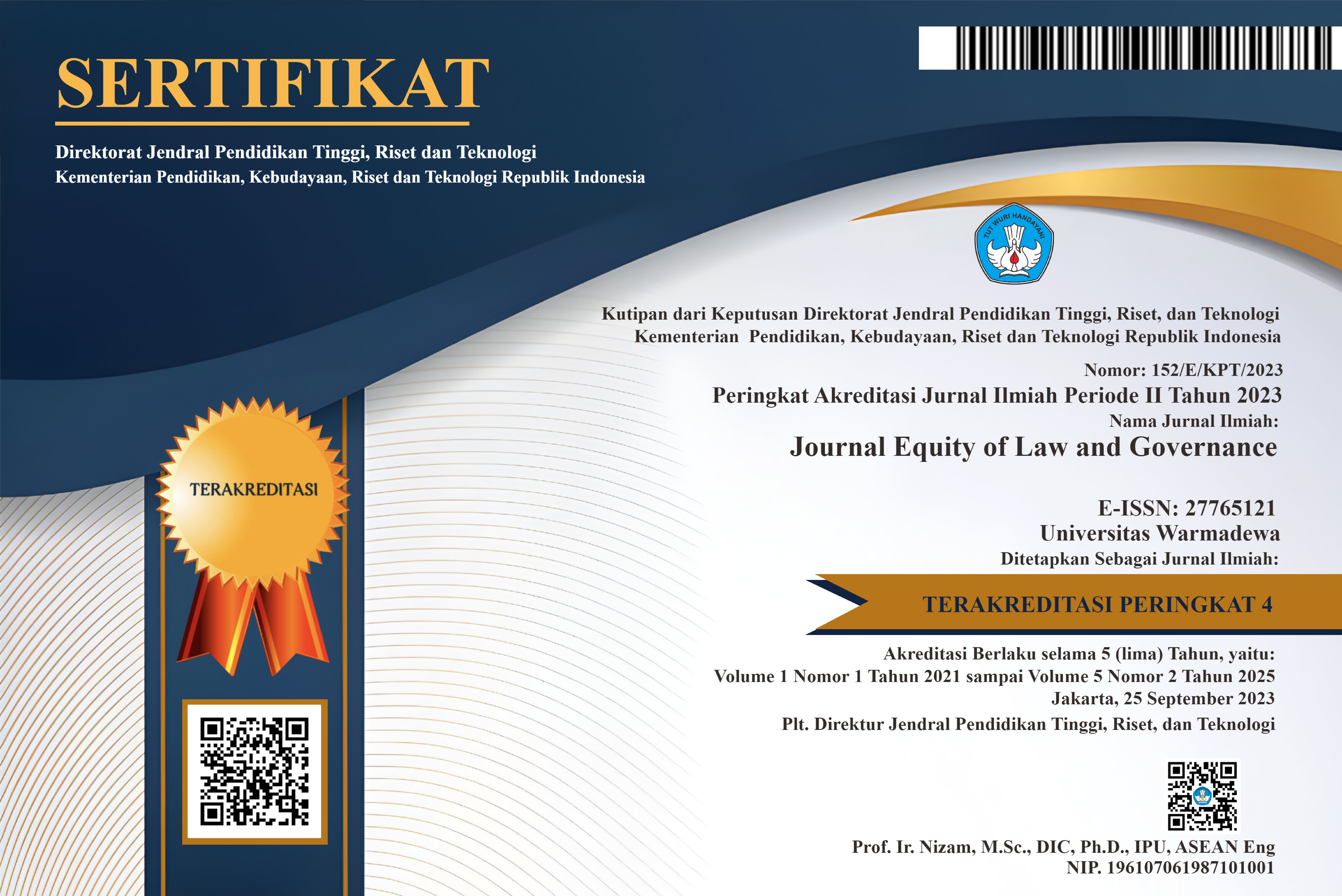Principles of Justice and Legal Certainty by election organizers Regarding Conditions for Nominating Regional Heads
Abstract
This study aimed to understand the considerations of the judges of the Honorary Council for Election Organizers (DKPP) in handling cases of violations of law and ethics by regional head election organizers, as reflected in the 161-PKE-DKPP/XI/2020 decision. This study adopted a normative or doctrinal legal research method, utilizing primary, secondary, and tertiary legal materials. Analysis was conducted through a theoretical descriptive approach to the problem faced. The results showed that the DKPP judges criticized the South Halmahera KPU for its lack of professionalism in examining the nomination requirements, stating that the KPU should not only understand the nomination PKPU and Juknis textually, but also substantively. The DKPP judge's decision showed high professionalism, prudence, and wisdom, with deep consideration based on existing norms. However, in terms of rejecting the fulfillment of the nomination requirements, the South Halmahera KPU also had applied the principle of legal certainty which is considered the appropriate legal norm in the context of the South Halmahera district head election.
References
Fatah, A., & Sariwating, L. (2020, September 7). KPU Halsel tolak pendaftaran petahana Bahrain-Muchlis. ANTARA MALUKU. Retrieved from https://ambon.antaranews.com/berita/86182/kpu-halsel-tolak-pendaftaran-petahana-bahrain-muchlis
Kolang, F. E., Pondaag, A., & Londa, J. (2022). Penyelenggaraan Pemilihan Umum yang Jujur, Adil dan Bersih Menurut Undang-Undang Nomor 7 Tahun 2017 tentang Pemilihan Umum." 10.4 (2022). Lex Administratum, 10(4).
Muhammad Ja’far. (2019). Eksistensi Dan Integritas Bawaslu Dalam Penanganan Sengketa Pemilu. Madani Legal Review, 2(1), 59–70. doi: 10.31850/malrev.v2i1.332
Nasef, M. I. (2014). Studi Kritis Mengenai Kewenangan Dewan Kehormatan Penyelenggara Pemilu Dalam Mengawal Electoral Integrity di Indonesia. Jurnal Hukum Ius Quia Iustum, 21(3), 378–401. doi: 10.20885/iustum.vol21.iss3.art3
Norris, Pippa, & Nai, A. (2017). Election watchdogs: Transparency, accountability and integrity. Oxford University Press.
Pangestu, A. (2022). Upaya Meminimalisir Potensi Pelanggaran Kode Etik Penyelenggara Pemilu Pada Pemilu Serentak 2024. Jurnal Bawaslu Provinsi Kepulauan Riau, 4(1).
Sahrasad, H. (2016). Indonesian Pluralism and Democracy Under Challenge: A Social Reflection. JICSA (Journal of Islamic Civilization in Southeast Asia), 5(1), 14–49. doi: 10.24252/jicsa.v5i1a2
Tranfield, D., Denyer, D., & Smart, P. (2003). Towards a Methodology for Developing Evidenceâ€Informed Management Knowledge by Means of Systematic Review. British Journal of Management, 14(3), 207–222. doi: 10.1111/1467-8551.00375
Widodo, H. (2018). Hukum Acara Sengketa Pemilukada Dinamika di Mahkamah Konstitusi. Konstituti Press.
Wilar Fenny, W. (2019). Stakeholder Pemilu Dalam Menyukseskan Pelaksanaan Pemilu Serentak 17 April Tahun 2019. HOLISTIK, Journal of Social and Culture, 12(1).
Wilkinson, S. (2006). Votes and violence: Electoral competition and ethnic riots in India. United Kingdom: Cambridge University Press.
 Abstract viewed = 47 times
Abstract viewed = 47 times
 PDF downloaded = 31 times
PDF downloaded = 31 times













